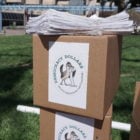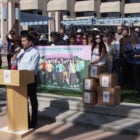Homepage Featured
Fix for hobbled public financing system on Albuquerque ballot
|
Boxes of signed democracy dollar petitions were delivered to the Albuquerque City Clerk in early August 2017. Albuquerque’s beleaguered public financing program could become more attractive to people running for mayor or city council if a proposition before voters in next week’s election is successful.
The changes would boost the amount of money going to mayoral candidates whose campaigns qualify for public money. Plus, Albuquerque residents would be allowed to direct additional money to mayoral and city council candidates of their choice, in $25 increments.
The proposal is being heatedly debated in the final days before the election. Detractors say the program will cost Albuquerque a lot and favor incumbents or other candidates backed by organized groups with resources to help them. Proponents say public financing, including this effort to strengthen Albuquerque’s system, would help diminish the influence of money on politics, and encourage more people to run for office.
Problem in search of a solution
The proposal would update Albuquerque’s original public financing program for mayoral and city council candidates created in 2005 with high hopes of decreasing the influence of private money in elections. The current system requires candidates to demonstrate they have some measure of community support before receiving public money, through gathering qualifying contributions and signatures from a certain percentage of voters.

